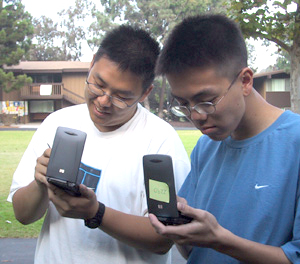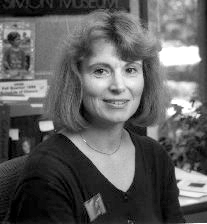Gabriele Wienhausen: On Culture, Art, Technology, and Education
|
6.5.03 - "Today's undergraduate students find themselves in a world that is changing constantly," says Gabriele Wienhausen, Provost of Sixth College, the newest of UCSD's undergraduate colleges. "You could explain it by applying Moore's Law¹ to education," she continues with a laugh. "There's so much to learn that four years is no longer sufficient to become knowledgeable in a given discipline, much less about life. So students have to learn to adapt quickly. They will change jobs, possibly entire careers, six times on average over the course of their lifetimes. They will have to know how to work in interdisciplinary teams made of people with quite varied professional backgrounds. They will live in a global world and need to appreciate different cultures, different ways of thinking.
"And computing and telecommunications technology will be an important part of their lives, period," she says emphatically. "One of my colleagues, Larry Smarr, describes what we're doing as a 'living laboratory for the digital lifestyle.' We are enabling students to 'live the technology': What can and cannot be done with it, what are its pitfalls, and what ethical questions does it raise?"
That's the challenge Wienhausen embraced when she became provost of Sixth College. Colleges at UCSD are organized like those at Oxford, which date back to the 13th century. Each of UCSD's colleges provides a residential "home" and determines graduation requirements for its students.
Wienhausen's life over the previous two years was devoted to designing and implementing a learning environment to foster the kinds of skills that will be required in the world. With a college theme of "Culture, Art, and Technology," Wienhausen convened a faculty committee drawn from the sciences, engineering, and the arts to develop the curriculum's core sequence, hired staff, took up physical residence on campus, began planning new facilities to be built, and developed a Web site and promotional materials.
Because this was the first college at UCSD that was expressly "technology-driven," Wienhausen spent endless hours convincing her colleagues how its needs were very different from those of the other five colleges and, hence, required a different level of support. Largely due to her persuasiveness, Sixth College is the first on campus to have its own Chief Technology Officer.
While wireless deployment is extending in increments across the campus, Sixth is the only college that is entirely wireless. As a matter of principle, each of the 285 students in the inaugural class this fall was equipped with an HP Jornada handheld device to keep, and the first few days of orientation focused on getting to know the campus and each other via software "games" developed on the Jornada. The experience itself was dubbed "explorientation" by one of the student researchers, also a Cal-((IT)² scholar, who helped develop the environment.
 "As adults, we underestimate students' understanding of technology," says Wienhausen. "It's natural for them, and they understand it as a common part of their life. One of our goals is to help them develop skills to find, sort through, and evaluate information, also how to find 'experts.' So they have to become 'information-literate.' Then we want them to take it one step further and use it for creative purposes, as a medium for communication and self expression." So Wienhausen and staff have created specialized facilities, such as a "digital playroom" with higher-end equipment than what the students typically bring to campus, to support development of digital art, videos, and music.
"As adults, we underestimate students' understanding of technology," says Wienhausen. "It's natural for them, and they understand it as a common part of their life. One of our goals is to help them develop skills to find, sort through, and evaluate information, also how to find 'experts.' So they have to become 'information-literate.' Then we want them to take it one step further and use it for creative purposes, as a medium for communication and self expression." So Wienhausen and staff have created specialized facilities, such as a "digital playroom" with higher-end equipment than what the students typically bring to campus, to support development of digital art, videos, and music.
Interestingly, the environment will also teach students how to cope with failure. Students will be placed in situations in which the equipment will fail. How will they respond? Will they be able to analyze why or where the failure occurred and how to address it?
"Technology is not magic or failsafe," says Wienhausen. "We want students to experience failure, but in a safe environment."
Wienhausen's team is also applying ethnographic research principles to understand how the students use technology. How will use of technology change sense of community? How will students incorporate technology into their daily lives? What functions are they using? What functions do they express a need for? How does wireless usage affect use of hard-wired computers? How will students use technology to learn not just in the classroom but from each other in more informal settings?
Wienhausen also describes Sixth College as an "education R&D unit" for the campus at large. "A college, in the sense that we use that term at UCSD, is an ideal 'controlled experiment' because it combines academic affairs and student life - all the 'pushes and pulls' that can help guide the campus on strategic decisions related to technology investment. Campus administrators are excited because this testbed will help them determine what direction in which to head. And, even more importantly, it will help them continue to position UCSD as a national leader in telecommunications and information technology."
But Wienhausen takes this point one step further: Her experiment is changing the underlying sociology of the campus. "We pulling responsible units together who, in the past, worked in so-called 'silos' without talking or interacting with each other," she says. "Now that these people are beginning to understand each other's needs, they're working together to identify missing components that will strengthen the technological base. Witness, as Exhibit A, recent campus network infrastructure development to support both production networking and network research testbeds."
Wienhausen was named a 2002 Education & Academia Finalist in the Computerworld Honors program. She was cited for her paper "Reinventing the College Campus." According to Joe Levy, President, Computerworld, "Each year, the Computerworld Honors Program identifies and honors men and women from around the world whose
visionary use of Information Technology produces and promotes positive social, economic and educational change. The innovators represented … are true revolutionaries in their industry and have been recognized by the leading chairmen of the industry as such."
Wienhausen received her Ph.D. from the Westfalische Wilhelms-Universitat, Munster, Germany. She is the co-Principal Investigator of the Howard Hughes Undergraduate Science Enrichment Program and co-Director of the doctoral program in Mathematics and Science Education offered jointly by UCSD and SDSU.
¹ A law, named after Gordon Moore who co-founded Intel, that says the number of transistors per square inch on integrated circuits has been doubling (and will continue to do so) every year since the integrated circuit was invented.

